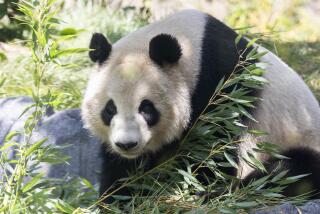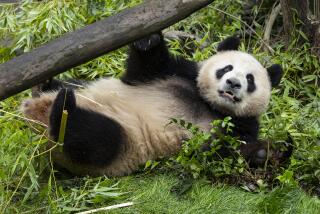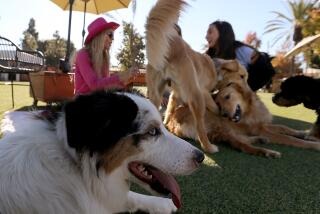San Diego’s Safari Park welcomes a baby echidna, or ‘puggle’
- Share via
SAN DIEGO — One of the San Diego Zoo Safari Park’s newest residents is still learning to move about on wobbly legs and peering at the world through tiny eyes.
The Safari Park announced this week the hatching of its first-ever echidna, or “puggle,” as the babies are known. The little critter doesn’t have a name yet, and its caretakers have yet to determine its sex. But they believe the puggle hatched on Valentine’s Day and say it is doing just fine.
“We are thrilled and excited to welcome our first-ever echidna puggle at the San Diego Zoo Safari Park,” said Savanna Smith, a wildlife care specialist at the facility, in a news release. “It is an honor to care for this little one.”
The puggle still spends its days slumbering in the safety of a dark burrow in the ground. Its mother stays nearby and visits the burrow to nurse her baby every three to six days.
At birth, the puggle weighed less than 1 ounce — lighter than a slice of bread — and has already grown to 1 pound. But this baby still has some growing to do; a full-size echidna can weigh as much as 22 pounds and reach 2½ feet in length.
Echidnas live throughout Australia, Tasmania and New Guinea, where they burrow into the ground looking for termites and other insects. They lap up the insects with their long tongues and grind them into a paste against the roof of their mouth. It may seem an odd way to eat, but echidnas have no teeth.
While they don’t have great vision, echidnas have a keen sense of smell and sharp claws that dig into the earth. Fur studded with sharp spines keeps them safe as they move about.
These creatures are one of only two mammals that lay eggs; the other is the platypus, which can also be found at the Safari Park.
The new puggle is a short-beaked echidna, a relatively common species. Its close relative, the long-beaked echidna, is critically endangered. The Safari Park hopes that raising this puggle will provide clues on how to protect and preserve its cousin species.
Wosen writes for the San Diego Union-Tribune.
More to Read
Sign up for Essential California
The most important California stories and recommendations in your inbox every morning.
You may occasionally receive promotional content from the Los Angeles Times.














